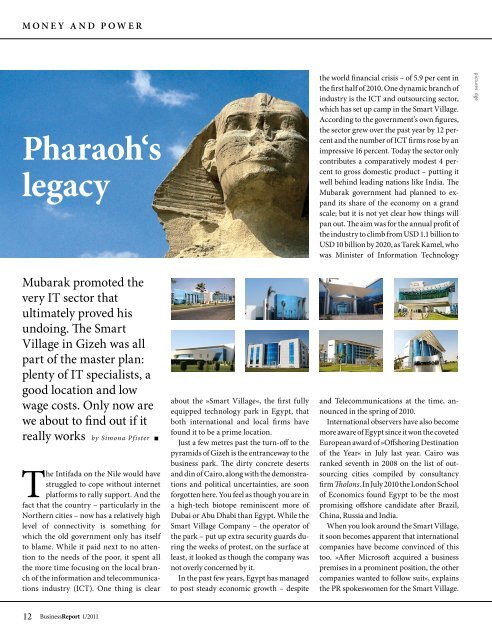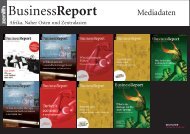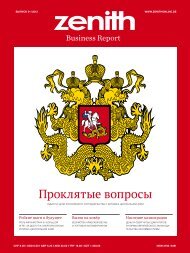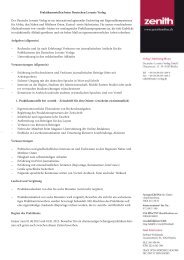Create successful ePaper yourself
Turn your PDF publications into a flip-book with our unique Google optimized e-Paper software.
MONEy AND POwER<br />
Pharaoh‘s<br />
legacy<br />
Mubarak promoted the<br />
very IT sector that<br />
ultimately proved his<br />
undoing. The Smart<br />
Village in Gizeh was all<br />
part of the master plan:<br />
plenty of IT specialists, a<br />
good location and low<br />
wage costs. Only now are<br />
we about to find out if it<br />
really works by Simona Pfister<br />
The Intifada on the Nile would have<br />
struggled to cope without internet<br />
platforms to rally support. And the<br />
fact that the country – particularly in the<br />
Northern cities – now has a relatively high<br />
level of connectivity is something for<br />
which the old government only has itself<br />
to blame. While it paid next to no attention<br />
to the needs of the poor, it spent all<br />
the more time focusing on the local branch<br />
of the information and telecommunications<br />
industry (ICT). One thing is clear<br />
12 BusinessReport 1/2011<br />
about the »Smart Village«, the first fully<br />
equipped technology park in Egypt, that<br />
both international and local firms have<br />
found it to be a prime location.<br />
Just a few metres past the turn-off to the<br />
pyramids of Gizeh is the entranceway to the<br />
business park. The dirty concrete deserts<br />
and din of Cairo, along with the demonstrations<br />
and political uncertainties, are soon<br />
forgotten here. You feel as though you are in<br />
a high-tech biotope reminiscent more of<br />
Dubai or Abu Dhabi than Egypt. While the<br />
Smart Village Company – the operator of<br />
the park – put up extra security guards during<br />
the weeks of protest, on the surface at<br />
least, it looked as though the company was<br />
not overly concerned by it.<br />
In the past few years, Egypt has managed<br />
to post steady economic growth – despite<br />
the world financial crisis – of 5.9 per cent in<br />
the first half of 2010. One dynamic branch of<br />
industry is the ICT and outsourcing sector,<br />
which has set up camp in the Smart Village.<br />
According to the government’s own figures,<br />
the sector grew over the past year by 12 percent<br />
and the number of ICT firms rose by an<br />
impressive 16 percent. Today the sector only<br />
contributes a comparatively modest 4 percent<br />
to gross domestic product – putting it<br />
well behind leading nations like India. The<br />
Mubarak government had planned to expand<br />
its share of the economy on a grand<br />
scale; but it is not yet clear how things will<br />
pan out. The aim was for the annual profit of<br />
the industry to climb from USD 1.1 billion to<br />
USD 10 billion by 2020, as Tarek Kamel, who<br />
was Minister of Information Technology<br />
and Telecommunications at the time, announced<br />
in the spring of 2010.<br />
International observers have also become<br />
more aware of Egypt since it won the coveted<br />
European award of »Offshoring Destination<br />
of the Year« in July last year. Cairo was<br />
ranked seventh in 2008 on the list of outsourcing<br />
cities compiled by consultancy<br />
firm Tholons. In July 2010 the London School<br />
of Economics found Egypt to be the most<br />
promising offshore candidate after Brazil,<br />
China, Russia and India.<br />
When you look around the Smart Village,<br />
it soon becomes apparent that international<br />
companies have become convinced of this<br />
too. »After Microsoft acquired a business<br />
premises in a prominent position, the other<br />
companies wanted to follow suit«, explains<br />
the PR spokeswomen for the Smart Village.<br />
pictures: dge

















